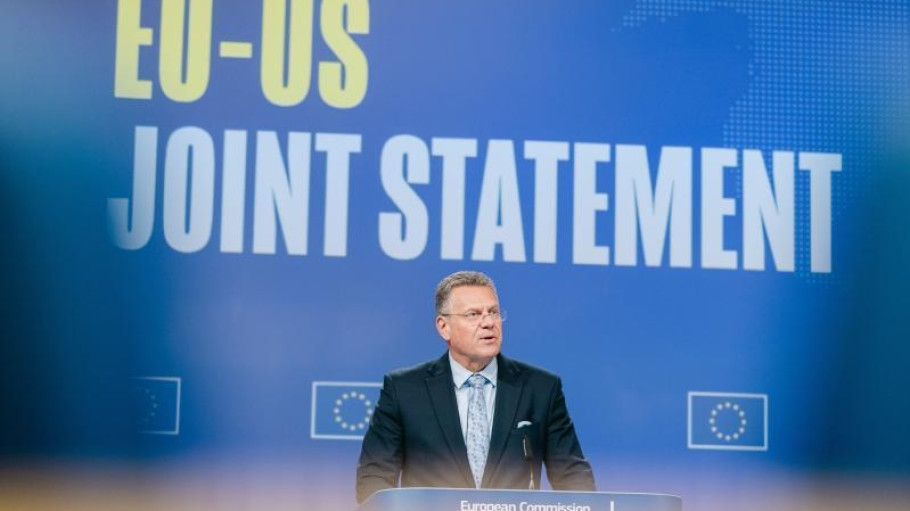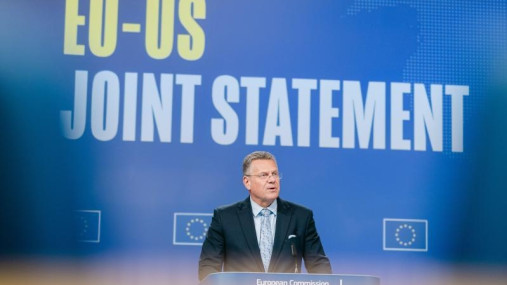
Press releases » EU-U.S. statement: co-operation on steel is intentionally confirmed but uncertainty remains as 50% tariff continues
EU-U.S. statement: co-operation on steel is intentionally confirmed but uncertainty remains as 50% tariff continues
Downloads and links
Recent updates

Brussels, 21 August 2025 – Joint written EU-U.S. statement broadly confirms the deal struck by Donald Trump and Ursula von der Leyen on 27 July: 15% U.S. import tariff on most EU products but 50% on EU steel, aluminium and their derivatives with the intention to consider working towards a tariff rate quota (TRQ) for EU exports and ring-fencing against global steel and aluminium overcapacity.
“The text remains vague but we recognize the efforts undertaken by Commission President von der Leyen and Trade Commissioner Šefčovič to find a joint U.S.-EU initiative on steel, aluminium and their derivatives. Work must start immediately to get back to preferential access for traditional EU steel volumes to the U.S. as no deadline is set and we already see the huge delay, for instance, in the implementation of the U.S.-UK deal", said Axel Eggert, Director General of the European Steel Association (EUROFER).
"Ring-fencing against global steel overcapacity means close alignment of the EU's and the US' import regimes. With the proposal in September for a new, highly effective trade measure replacing the EU steel safeguards, the Commission must now prove that they are willing to take bold action that aligns the objective of the EU Steel Action Plan to promote and protect domestic steel capacity and the objectives of the deal with the U.S. Studies show that the impacts of an effective EU steel trade measure on downstream sectors are negligible", stressed Mr. Eggert.
The joint statement on a United States-European Union framework on an agreement on reciprocal, fair and balanced trade of 21 August 2025 says on steel and aluminium: "With respect to steel, aluminium, and their derivative products, the European Union and the United States intend to consider the possibility to cooperate on ring-fencing their respective domestic markets from overcapacity, while ensuring secure supply chains between each other, including through tariff-rate quota solutions."
Next to 50% U.S. tariffs on EU steel, a 15% tariff on most other products means an additional huge burden for EU steel, as many EU exports are steel intensive, such as machinery and vehicles. In 2024 – at that time with a 2.5% tariff - around 760,000 EU vehicles were exported to the U.S. This can be estimated at around 1 million tonnes of EU steel, a significant part of which may disappear as a result of the new 15% tariff on vehicles. The EU steel industry had already lost up to 1 million tonnes of steel exports to the U.S. since the application of U.S. section 232 in 2018, down from 4.6 to 3.8 million tonnes in 2024, of which around 600,000 tonnes had to pay a 25% tariff. The longer the 50% tariff remains the more likely it will be that also those exports will be eliminated.
Since 2018, the European steel industry has lost a staggering 30 million tonnes of steel in the EU internal market and on export markets, due to the effects of global steel overcapacity – driven by countries from Asia, North Africa and the Middle East – as well as the effects of U.S. Section 232, and a decrease in steel demand in EU steel using sectors. The effects of the latest additional U.S. tariffs on EU steel applied since March (25%) and June (50%) had already a further destructive impact on the sector. The European Commission promised in its Steel and Metals Action Plan a “highly effective steel trade measure” to be presented by September 2025.
Photo source: EC - Audiovisual Services, Photographer Christophe Licoppe © European Union, 2025
Contact
Lucia Sali, Spokesperson and Head of Communications, +32 2 738 79 35, (l.sali@eurofer.eu)
About the European Steel Association (EUROFER)
EUROFER AISBL is located in Brussels and was founded in 1976. It represents the entirety of steel production in the European Union. EUROFER members are steel companies and national steel federations throughout the EU. The major steel companies and national steel federation of Turkey, Ukraine and the United Kingdom are associate members.
The European Steel Association is recorded in the EU transparency register: 93038071152-83.
About the European steel industry
The European steel industry is a world leader in innovation and environmental sustainability. It has a turnover of around €215 billion and directly employs around 298,000 highly-skilled people, producing on average 146 million tonnes of steel per year. More than 500 steel production sites across 22 EU Member States provide direct and indirect employment to millions more European citizens. Closely integrated with Europe’s manufacturing and construction industries, steel is the backbone for development, growth and employment in Europe.
Steel is the most versatile industrial material in the world. The thousands of different grades and types of steel developed by the industry make the modern world possible. Steel is 100% recyclable and therefore is a fundamental part of the circular economy. As a basic engineering material, steel is also an essential factor in the development and deployment of innovative, CO2-mitigating technologies, improving resource efficiency and fostering sustainable development in Europe.

Download files or visit links related to this content
Brussels, 20 February 2026 – EU steel exports to the United States fell by 30% in the second half of 2025 compared to the same period in 2024, after the imposition of 50% tariffs according to new Eurostat data. The expansion of the U.S. tariff regime to include downstream steel-intensive products, such as machinery and equipment, is expected to amplify its impact on both EU steel producers and their customers. The European Steel Association (EUROFER) said the figures underscore the need for any EU-US trade agreement to be fair, balanced and enforceable.
Joint Industry Statement
Brussels, 11 February 2026 - The European Steel Association (EUROFER) has backed a call to action adopted by European companies and industries in Antwerp today, which includes a demand on the EU to take urgent action to bring electricity prices down as a condition for Europe’s industrial drive, competitiveness and economic resilience.